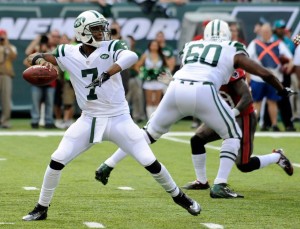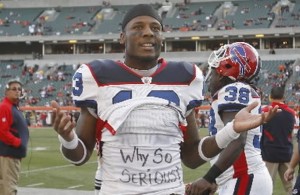by Chase Stuart
on September 12, 2015
 Tyrod Taylor was a sixth round pick of the Baltimore Ravens in 2011. Since then, he’s thrown just 35 passes over four years, before signing with the Bills as a free agent in the 2015 offseason. Now, after beating out Matt Cassel and EJ Manuel in training camp, Taylor will be the Buffalo Bills opening day starter in 2015.
Tyrod Taylor was a sixth round pick of the Baltimore Ravens in 2011. Since then, he’s thrown just 35 passes over four years, before signing with the Bills as a free agent in the 2015 offseason. Now, after beating out Matt Cassel and EJ Manuel in training camp, Taylor will be the Buffalo Bills opening day starter in 2015.
How rare is this? Taylor was in the NFL for at least four seasons and never started a game in his NFL career; now he’s his team’s opening day starter. Since 1970, there are just four other quarterbacks who meet that profile. In reverse order… [continue reading…]
Tagged as:
Bills,
Tyrod Taylor
{ }
by Chase Stuart
on October 17, 2014

Chandler tries out for the role of Ivan Drago
The early 1990s were a simpler time. That’s doubly true when it comes to passing statistics, and triply true for tight ends. In week 2, the Bills and 49ers played a famous game in which neither team punted. In week 4 of the 2014 season, the Bears and Packers played just the second game in NFL history with no punts. A streak of 22 years and 2 weeks is pretty long, but that’s not even the longest streak to come out of that Buffalo/San Francisco game.
The Bills defeated the 49ers in no small part thanks to Pete Metzelaars, who caught four passes for 113 yards and 2 touchdowns. And until last Sunday, that was the last time a Buffalo Bills tight end gained 100 yards in a game. In 1993, Metzelaars had a 98-yard game; Lonnie Johnson had an 86-yard game two years later, and gained 90 yards in a 1996 game. Jay Riemersma had three 80+ yard games for the Bills, but that was about it. For over 22 years, no Buffalo Bills tight end hit the hundred yard mark until Scott Chandler caught 6 passes for 105 yards against New England.
In between Metzelaars and Chandler, there were 289 games where a tight end gained at least 100 receiving yards in a game. Unsurprisingly, the Patriots lead the way with 29 of those games, with Rob Gronkowski and Ben Coates responsible for 22 such performances. The table below shows — for each franchise — the number of tight ends who gained 100 receiving yards between week 3 of the ’92 season and week 5 of this year. I have also included (in parentheses) the number of 100-yard games recorded by each tight end for that franchise: [continue reading…]
Tagged as:
Bills,
Tight Ends
{ }
by Chase Stuart
on June 20, 2014
During the 2013 offseason, I wrote 32 articles under the RPO 2013 tag. In my Predictions in Review series, I review those preview articles with the benefit of hindsight. Previously, I reviewed the AFC West, the NFC West, the AFC South, the NFC South, the AFC North, and the NFC North. Today, the AFC East.
Buffalo Bills website complains about team’s schedule, June 24, 2013
Last summer, the Buffalo Bills website argued that the NFL schedule makers did Buffalo a big injustice by giving the team six games against teams coming off extra rest. That was the most in the league: no other team had five such games, and as it turned out, the two other teams that had 4 games against teams with extra rest were the two most disappointing teams in the NFL (Houston and Atlanta). Meanwhile, the Chiefs, 49ers, and Patriots were the only teams in 2013 not to face an opponent coming off extra rest, and all three wound up making the playoffs.
So yeah, the Bills had a legitimate gripe. But what actually happened?
- The Jets played the Patriots on Thursday night in week two, and then hosted the Bills ten days later in week three. The Jets won, 27-20.
- The Jets then got to play the Bills in week 11 after New York’s week ten bye. That wasn’t so helpful for Gang Green: the Bills crushed the Jets at home, 37-14.
- Another division opponent, Miami, got to play Buffalo after the Dolphins’ bye week. But the Bills went into Miami in week 7 and won, 23-21.
- While the Bills were beating Miami, the Saints enjoyed a bye. In week 8, Buffalo went to New Orleans and was slaughtered, 35-17.
- In week 12, the Bills were off, but the team’s week 13 opponent, Atlanta, was playing on Thursday night. So Buffalo’s game off the bye came against a team with 10 days rest. In Toronto, the Bills collapsed at the end, ultimately losing in overtime, 34-31.
- In week 14, the Jaguars played on Thursday night and won their third game in a row; in week 15, Buffalo edged the Jaguars, 27-20.
[continue reading…]
Tagged as:
Bills,
Dolphins,
Jets,
Patriots,
Predictions In Review 2013
{ }
by Chase Stuart
on February 17, 2014

Smith looks to go deep against the Bucs.
We were very spoiled last year.
Andrew Luck,
Robert Griffin III, and
Russell Wilson had outstanding rookie seasons in 2012, and perhaps that set expectations a bit high for the 2013 class. No one will confuse those three with
EJ Manuel,
Geno Smith, and
Mike Glennon, all of whom struggled for most of their rookie seasons. But while Smith and Glennon didn’t produce excellent numbers, they produced very
interesting ones.
Among the 35 quarterbacks with the most pass attempts, Glennon finished a very pedestrian 27th in Adjusted Net Yards per Attempt. But he did it in a very unique way: Glennon had an outstanding 19/9 touchdown-to-interception ratio, but he ranked dead last in Net Yards per Attempt. One reason for that is Glennon averaged only 10.6 yards per completion, the 3rd worst average among the 35 passers.
Smith finished 34th in ANY/A, largely due to his horrific 12/21 TD/INT ratio. He was a bit better in NY/A, ranking 28th, but what’s interesting about the Jets quarterback is that he ranked 7th in yards per completion. That metric is not a particularly effective measure of passer quality — after all, Matt Ryan ranked 35th — but it is a pretty good way to describe a quarterback’s style. While both Glennon and Smith were below average, they were below average in very different ways. [continue reading…]
Tagged as:
Bills,
Bucs,
EJ Manuel,
Geno Smith,
Jets,
Mike Glennon
{ }
by Chase Stuart
on June 24, 2013

Steve Johnson doesn't care about the NFL schedule.
Chris Brown of buffalobills.com is
not happy with the way the Bills’ schedule shakes out. Again. Last year,
this is what Brown wrote after examining the 2012 schedule:
After playing what is expected to be a physical contest with the 49ers in San Francisco in Week 5 [Chase: In retrospect, not that physical], the Bills then face the Cardinals in Arizona in Week 6. The Cards will have the benefit of three extra days of prep time for Buffalo as their Week 5 game is on Thursday night.
The very next week when the Bills play host to Tennessee, the Titans will also have three extra days of prep time for Buffalo because they’re playing on Thursday night the previous week (Week 6) as well.
The Bills look to get a break as they’ll have a bye week in Week 8 to get two weeks to prep for the Texans in Houston. But that extra prep time will be a wash because Houston also has their bye in Week 8.
Finally while the Bills are battling the Texans in Houston, the Patriots will be on their couches watching at home while their head coach grinds tape for two weeks to prepare for the Bills who travel to New England in Week 10 as the Pats have their bye in Week 9.
Brown’s claims were accurate: Buffalo did face a team coming off extra rest (i.e., more than eight days) four times in five weeks. Of course, those were the only times all season the Bills played a team coming off extra rest. Still, if we look at the 2012 season, it’s fair to say the Bills got the short end of the scheduling stick.
But they don’t have the biggest beef. Philadelphia faced four teams coming off bye weeks last year, tying the ’09 Falcons, ’05 Chargers, ’03 Cowboys, and ’99 Chargers for facing the most teams coming off a bye week since 1994.
[continue reading…]
Tagged as:
Bills,
Bye Weeks,
RPO 2013
{ }
by Chase Stuart
on December 31, 2012
This season, I published power rankings after each week where I stated my updated projected number of wins for each team. The point of those posts was to put in writing my thoughts at that time, so that once the season was over, I could look back and see how I did. Over the next two weeks, that’s exactly what we’re going to do.
The picture below graphs my projections for each team for each week of the season. I’ve also added the Vegas futures win totals for each team from the pre-season as the first data point in each graph and the final number of regular season wins for each team as the final data point. My projected win totals for each week N come following the conclusion of week N (i.e., my week 1 power rankings were released after week 1).

New England Patriots
Pre-season Projection: 12 wins
Maximum wins: 13 (after weeks 1 and 14)
Minimum wins: 10 (after weeks 6 and 7)
Week 1 comment: Incredible offensive weapons, an improved defense and a cupcake schedule. Only injuries on the offensive line or to Tom Brady could derail them.
The Patriots started hot with a big win over the Titans, but managed to lose nail-biters to the Cardinals and Ravens the next two weeks. A loss in Seattle — which was an upset, at the time — dropped them to 3-3 and my projected total to just 10 wins. An overtime win over the Jets the following week was unimpressive and didn’t cause me to bump them, but I kept steadily increasing their win total after that.
In the end, it was another monster statistical season for Brady and the Patriots. New England broke a record for offensive first downs and finished with the third most points scored in a season. I was a little bumpy in my New England projections, but they ended up landing right on the Vegas number.
New York Jets
Pre-season Projection: 8.5 wins
Maximum wins: 9 (after weeks 1 and 2)
Minimum wins: 6 (first after week 8)
Week 1 comment: The additions of Quinton Coples and LaRon Landry were easy to mock, but these two could make the Jets defense a top-three unit. So far, so good. Right tackle Austin Howard exceeded expectations by infinity against Mario Williams, and his play this year will be tied to the Jets success on offense.
The Jets best game of the season came in week 1, which inspired a glimmer of early-season hope. In the end, Coples and Landry had strong seasons, but the loss of Darrelle Revis and the disappointing years by Calvin Pace, Bryan Thomas, and Aaron Maybin prevented the Jets from having a complete defense. Mark Sanchez regressed, and injuries to Santonio Holmes, Dustin Keller, and Stephen Hill didn’t help the offense. Rex Ryan lost control of the team, again, and the Jets struggled against good teams early before disappointing against bad teams late. For the second straight year, the Jets lost their final three games of the season, and it appears like they will fire the offensive coordinator again, too.
[continue reading…]
Tagged as:
AFC East,
Bills,
Cowboys,
Dolphins,
Eagles,
Giants,
Jets,
NFC East,
Patriots,
Redskins
{ }
by Chase Stuart
on August 14, 2012

Stanford makes terrible quarterbacks.
Twice in four years, the Buffalo Bills have teased their fans. In 2008, the Bills started 5-1, and Peter King named
Trent Edwards his MVP
after the first quarter of the season. Edwards had led fourth-quarter comebacks and game-winning drives in the second and third weeks of the year, and he ranked in the
top-five in AY/A after seven weeks.
The former Stanford Cardinal would rank 24th in AY/A the rest of the season while Buffalo finished the year with a 2-8 record.

Fitzpatrick was smart enough to shave before the game.
The Bills won just ten games the next two seasons, but made some noise at the start of the 2011 season. Going back to the nerd well at quarterback, Buffalo raced out to a 5-2 start. Fitzpatrick led two fourth-quarter comebacks/game-winning drives and ranked
11th in AY/A after eight weeks. Unfortunately, the former Harvard star ranked
32nd in that metric over the last nine weeks of the season, and the Bills finished the season 1-8.
How unusual is it for a team to have such a hot start and cold finish? It’s simple enough to look at first-half/second-half splits, but I prefer a more nuanced approach by weighing each team game based on when it occurred; e.g., game 1 counts 16 times as much as game 16, game 2 counts 15 times as much as game 16, game 3 counts 14 times as much as game 16, and so on. I looked at each team since 1990 and calculated their actual winning percentage and their “weighted” winning percentage.
The 2011 Bills had a 0.375 winning percentage last year, but by placing greater weight on games earlier in the season, Buffalo had a 0.507 weighted winning percentage. In 2008, the Bills had a 0.438 actual winning percentage and a 0.566 weighted winning percentage. As it turns out, those were two of the five “strongest-starting” teams of the last five years. The table below lists the “strongest-starting teams” since 1990, along with their actual and weighted winning percentages. The last column represents the difference between the two winning percentages.
[continue reading…]
Tagged as:
AFC East,
Bills,
RPO 2012,
Ryan Fitzpatrick
{ }
 Tyrod Taylor was a sixth round pick of the Baltimore Ravens in 2011. Since then, he’s thrown just 35 passes over four years, before signing with the Bills as a free agent in the 2015 offseason. Now, after beating out Matt Cassel and EJ Manuel in training camp, Taylor will be the Buffalo Bills opening day starter in 2015.
Tyrod Taylor was a sixth round pick of the Baltimore Ravens in 2011. Since then, he’s thrown just 35 passes over four years, before signing with the Bills as a free agent in the 2015 offseason. Now, after beating out Matt Cassel and EJ Manuel in training camp, Taylor will be the Buffalo Bills opening day starter in 2015.





